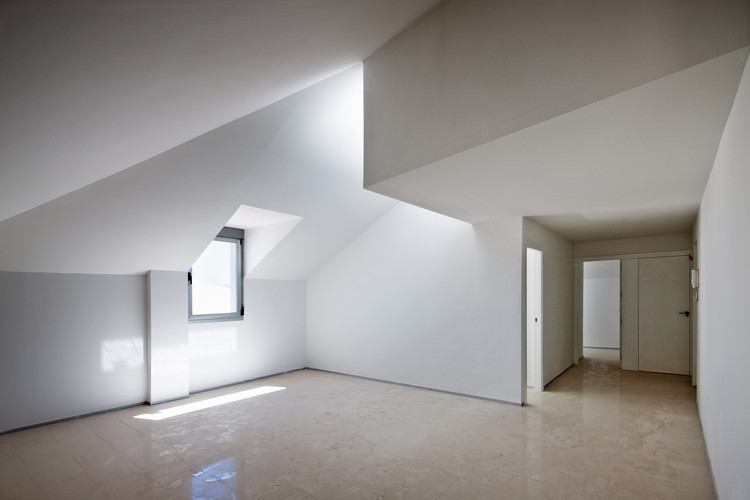
-
Architects: Elisa Valero Ramos
- Area: 424 m²
- Year: 2012
-
Photographs:Fernando Alda

Text description provided by the architects. A rental housing building in a village south of Granada, where Vega River begins to flow surrounded by the foothills of the Sierra Nevada Mountains.
Trapezoidal plot is located in a crossroad and has a buildable area of over 100 m2. The southwest side of the plot is adjacent, while other sides are streets: Carretera de Gojar on southeast, Avenida Carmen Morcillo on the northwest and Alhambra Street on the northeast.

The building is constructed occupying the entire plot, after the additional part was given from the City Council, consolidating the corner of the block. It has three floors above the ground and a basement that serves the local store on the ground floor. On the upper floors are located flats, each with two bedrooms and kitchen. Access to the building is from Avenida Carmen Morcillo. Staircase and elevator are placed in the middle, creating the core with the adjacent installations and leaving the rest of the floor free of installations.
From the upper floors magnificent views of the valley and Sierra Nevada can be enjoyed.
This work has been designed and built economical and racional. Economical not only in the construction but also maintaining the bulding in a sustainable way.

The main issue is the insulation to minimize energy losses and to optimize the use of natural light. Constructional airbricks are coated with insulation plasterboard in the inside and with ceramic coating on the outside, to create a better insulation.
All building facades, like a cover of the book, are coated with a stoneware double-burned in 1220 degrees and enameled in white sierra nevada colour. Entire building has been modulated for these 40x80 stoneware pieces, which are anchored to the facade by hidden staples.

The research in new materials is realized through the use of an enamel which is characteristic for
it’s ability to capture CO2. Composition of calcium hydroxide Ca (OH) 2 created through optimization and reorganization of the carbide lime waste generated in the process of obtaining acetylene gas. The primary particle size, due to obtaining this alternative route is presented below 100nm (nanomaterial) enabling a high reactivity towards CO2. Ca (OH) 2 + H2O + CO2 CaCO3. According to this equation: 0.59 tonnes of CO2 per tonne of Ca (OH) 2. Moisture conditions are optimal to favor Gójar setting process.
This stoneware shines in the sun like snow in the Sierra Nevada, coating all the building’s walls and roof with 40x80 pieces.















